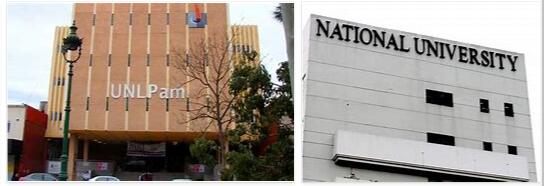National University of La Pampa. Argentine public university with headquarters in the city of Santa Rosa, in the province of La Pampa, Argentina. It has several research programs, especially in the areas of biology and agronomy.
Historical review
On September 2, 1958, Dr. Bonicatto submitted the requested project to the national comptroller, Dr. Ismael Amit. He foresees that the University of La Pampa -as he proposes to call it- will have superior schools of Economic and Social Sciences and schools of Hygiene Visitors and Social Assistants, Electrotechnics, Obstetrics and Nursing.
On September 4, the National Comptroller of La Pampa, Dr. Amit, issued Law Decree 1644/58, also signed by Ministers Héctor Carlos Fazzini and Modesto Luis A. Del Sueldo. Approves the bases proposed for the creation, organization and operation of the University of La Pampa and provides for its creation with headquarters in the city of Santa Rosa, as part of the same program to expand education that would lead to the foundation of those of Jujuy, Catamarca, Lomas de Zamora, Entre Ríos, Luján, Misiones, Salta, San Juan, San Luis and Santiago del Estero.
Bases and objectives
- It is an entity of public law, autonomous and self-sufficient, whose purpose is to interpret the needs of society and stimulate change in it, as well as the promotion, dissemination and preservation of culture. It fulfills this purpose in direct and permanent contact with universal thought and pays particular attention to regional and national problems.
- It contributes to the development of culture, within the framework of a humanistic conception, through studies, scientific and technological research and artistic creation. It spreads the ideas, the achievements of scienceand the artistic achievements, through teaching and the various means of communication of knowledge. It has especially the purpose of forming democratic men.
- It is a community of faculty, students, graduates, and non-faculty staff. It seeks the integral and harmonic formation of its components and instills in them moral rectitude, civic responsibility and democratic convictions. It trains original researchers, suitable professionals and career teachers, socially committed and willing to serve a politically free, economically independent and socially just country model. It guides graduates in teaching and research tasks and through them strengthens their relationship with society. Develop instances of self-assessment in search of an improvement of academic activities.
- It is essentially democratic and as such affirms and defends the democratic doctrine. It is prescinding in ideological, political and religious matters, it ensures within its premises the broadest freedom of investigation and expression, but it does not disregard social, political and ideological facts and processes, but rather studies them scientifically and seeks to provide superior solutions. .
- In addition to its specific task as a study and higher education center, it seeks to spread the benefits of its direct cultural and social action, through university extension.
- Objectively studies and exposes its conclusions on national problems and provides technical advice to state institutions, being able to enter into agreements with private institutions provided that the nature of the latter responds to the general interest.
Faculties
- Faculty of Agronomy
- Faculty of Economic and Legal Sciences
- Faculty of Exact and Natural Sciences
- Faculty of Human Sciences
- Faculty of Veterinary Sciences (considered one of the best in South America)
- Faculty of Engineering
- rectory
University library
In the Open Library modality where the reader directly consults the necessary material, having more than 30,000 bibliographic titles and 1000 titles of periodical publications, whose theme is mostly oriented to the careers that are taught in the Faculties.
Services
Terminals for querying Databases that contain existing bibliographic material in the library, facilitating its location on the shelves.
Reading room
Computers for enabled users, available for internet browsing and utility operation
Printing service
Attention to the public where the loans are registered in a Box computerized system equipped with a video player and television for the observation of more than 700 movie titles.
